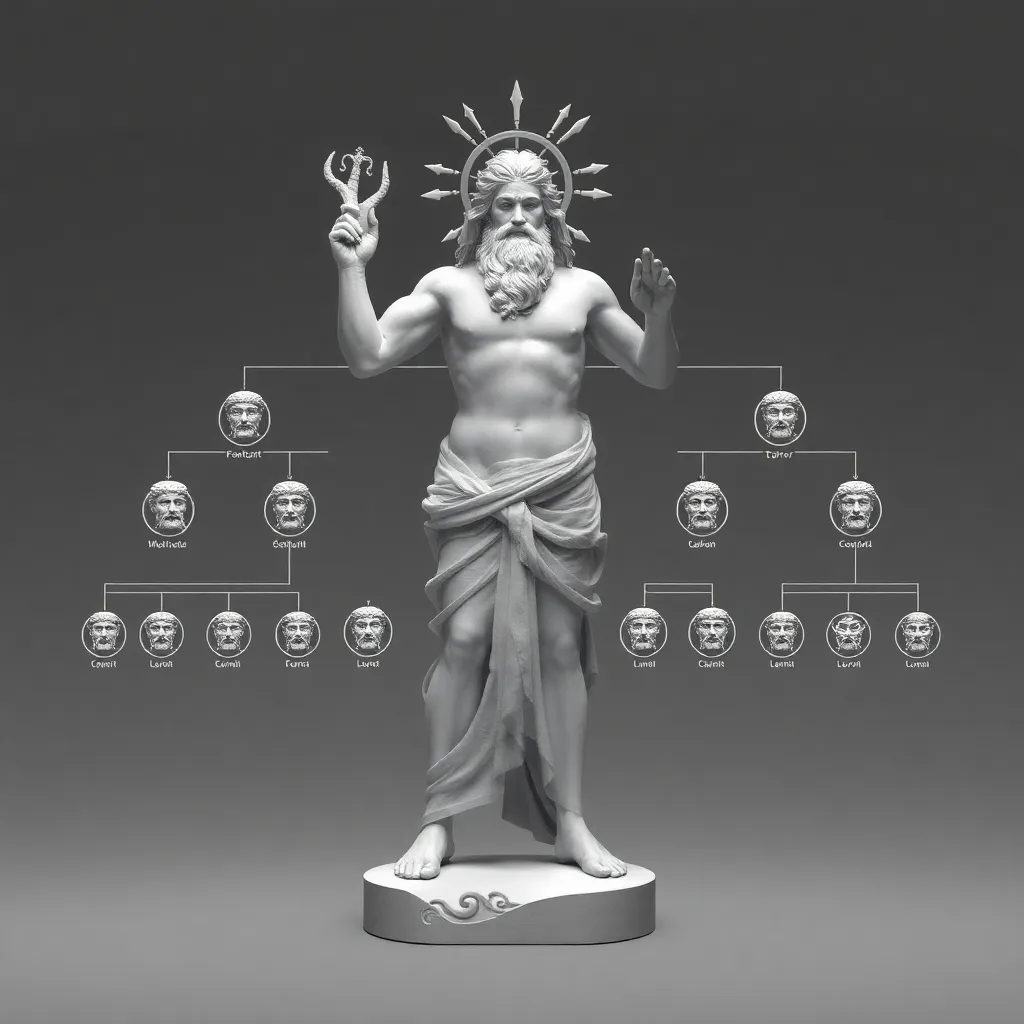The Myths Surrounding Zeus and His Offspring: A Divine Family Tree
I. Introduction
In the pantheon of Greek mythology, Zeus stands as the supreme deity, revered as the king of the gods and ruler of Mount Olympus. His influence extends beyond mere dominion; he embodies the principles of law, order, and justice. Understanding the myths surrounding Zeus and his offspring is crucial for grasping the complexities of ancient Greek culture and religion.
This article aims to explore the rich narratives associated with Zeus, his relationships, and the legacy of his progeny. By delving into these myths, we can uncover the values and beliefs of a civilization that has fascinated humanity for millennia.
II. The Origins of Zeus: The King of the Gods
Zeus was born to the Titans Cronus and Rhea, making him part of a lineage that would ultimately challenge the oppressive reign of the Titans. Fearing a prophecy that foretold his demise at the hands of his own children, Cronus swallowed each of his offspring at birth. However, Rhea managed to save Zeus, hiding him in a cave on the island of Crete.
As Zeus grew, he allied with his siblings—Hestia, Demeter, Hera, Hades, and Poseidon—and led a rebellion known as the Titanomachy. This ten-year war culminated in the defeat of Cronus and the Titans, resulting in Zeus and his siblings assuming their rightful places on Olympus. With the Titans imprisoned in Tartarus, Zeus established a new order among the gods.
III. The Nature of Zeus’ Relationships
Zeus is often portrayed as a figure of immense power and influence, but his personal life was marked by tumult and infidelity. His primary consort, Hera, was both his sister and wife, embodying the ideal of marital fidelity. However, Zeus’ numerous affairs led to a complex web of relationships with various goddesses and mortal women.
Some of the most notable affairs include:
- Europa: Zeus transformed into a bull to abduct Europa, leading to the birth of Minos.
- Leda: Zeus seduced Leda in the form of a swan, resulting in the birth of Helen of Troy.
- Danaë: Showering her with gold, he fathered Perseus.
These relationships not only highlight Zeus’ character flaws but also contribute to the rich tapestry of Greek mythology, creating heroes and demigods who would play significant roles in various myths.
IV. The Offspring of Zeus: A Divine Legacy
Zeus fathered many children, both divine and mortal, each of whom carried unique significance in Greek mythology. Some of the most notable offspring include:
- Athena: The goddess of wisdom and warfare, born from Zeus’ forehead.
- Apollo: The god of music, arts, and prophecy, born to Zeus and Leto.
- Hercules: A heroic demigod known for his strength and twelve labors, born to Zeus and Alcmene.
Each of these figures plays a pivotal role in mythology, often reflecting the values and ideals of ancient Greek society. Athena, for example, represents wisdom and strategic warfare, while Hercules embodies strength and heroism.
V. Myths vs. Reality: Debunking Common Misconceptions
Zeus has often been portrayed in literature and art as a figure of unbounded authority and virtue. However, many myths reveal a more complex and often flawed character. Common misconceptions include:
- Zeus as an entirely benevolent ruler: His numerous infidelities and acts of vengeance suggest a more complicated moral landscape.
- Zeus as a one-dimensional figure: He embodies both justice and chaos, showcasing the duality of his character.
The depictions of Zeus in various forms of media reflect the societal values of ancient Greece, which often grappled with themes of power, morality, and the consequences of hubris.
VI. The Role of Zeus in Various Myths
Zeus features prominently in numerous key myths, including Homer’s The Iliad and The Odyssey. He is often portrayed as a figure of justice and order, maintaining balance among gods and mortals alike. In The Iliad, Zeus is seen mediating conflicts between gods and influencing the outcomes of battles, while in The Odyssey, he aids Odysseus in his quest to return home.
However, Zeus also exhibits contradictory traits. In some stories, he is depicted as a capricious deity, quick to anger or to favor certain mortals over others. This duality contributes to the complexity of his character and the richness of the myths surrounding him.
VII. The Legacy of Zeus and His Offspring in Modern Culture
The myths of Zeus and his family continue to resonate in modern culture, influencing literature, film, and art. Films such as Clash of the Titans and Percy Jackson & The Olympians draw on these ancient stories, reinterpreting them for contemporary audiences.
Modern interpretations often emphasize themes of heroism, morality, and the struggles between divine and mortal realms. The relevance of these myths persists, as they address universal questions about power, identity, and the human condition.
VIII. Conclusion
In conclusion, the myths surrounding Zeus and his offspring provide a profound insight into ancient Greek culture and values. From his tumultuous relationships to the heroic legacies of his children, the narratives surrounding Zeus are as complex as they are captivating.
The enduring fascination with these myths underscores the significance of understanding them, not only for their historical context but also for their continued relevance in our modern world. As we explore these divine tales, we uncover the timeless themes that continue to shape our understanding of humanity.




